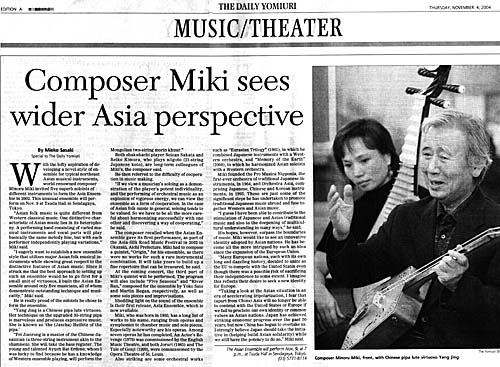By Mieko Sasaki
Special to The Daily Yomiuri
With the lofty aspiration of developing a novel style of ensemble for typical northeast Asian musical instruments, world-renowned composer Minoru Miki invited five superb soloists of different instruments to form the Asia Ensemble in 2002.
This unusual ensemble will perform on Nov.9 at Tsuda Hall in Sendagaya, Tokyo.
"Asian folk music is quite different from Western classical music. One distinctive characteristic of Asian music lies in its heterophony. A performing band consisting of varied musical instruments and vocal parts will play basically the same melody line, but with each performer independently playing variations," Miki said.
"I eagerly want to establish a new ensemble style that utilizes major Asian folk musical in struments while showing great respect to the distinctive features of Asian music. Since it struck me that the best approach to setting up such an ensemble would be to go first for a small unit of virtuosos, I built the Asian Ensemble around only five musicians, all of whom demonstrate outstanding technique and musicality," Miki said.
He is really proud of the soloists he chose to form the ensemble.
"Yang Jing is a Chinese pipa lute virtuoso. Her technique on the upgraded 30-string pipa is marvelous and produces expressive music. She is known as 'the (Jascha) Heifetz of the pipa.'
"Fei Jianrong is a master of the Chinese dasanxian (a three-string instrument akin to the shamisen). She will take the bass register. The young and talented Ayush Bat-Erdene, whom I was lucky to find because he has a knowledge of Western ensemble playing, will perform the Mongolian two-string morin khuur."
Both shakuhachi player Seizan Sakata and Reiko Kimura, who plays niigoto (21-string Japanese koto), are long-term colleagues of Miki's, the composer said.
He then referred to the difficulty of coopera tion in music making.
"If we view a musician's soloing as a demonstration of the player's potent individuality, and the performing of orchestral music as an explosion of vigorous energy, we can view the ensemble as a form of cooperation. In the case of Asian folk music in general, soloing tends to be valued. So we have to be all the more careful about harmonizing successfully with one other and discovering a way of cooperating," he sed.
The composer recalled when the Asian Ensemble gave its first performance, as part of the Asia-Silk Road Music Festival in 2002 in Okazaki, Aichi Prefecture. Miki had to compose a quintet, "Origin," for his ensemble, as there were no works for such a rare instrumental combination. It will take years to build up a fine repertoire that can be treasured, he said. |
At the coming concert, the third part of Miki's quintet will be performed. The program will also include "Five Seasons" and "river run," composed for the ensemble by Yoko Sato and Martin Regan, respectively, as well as some solo pieces and improvisations.
Shedding light on the sound of the ensemble is their first release, Asia Ensemble, which is now available.
Miki, who was born in 1930, has a long list of works to his name, ranging from operas and symphonies to chamber music and solo pieces. Especially noteworthy are his operas. Among seven operas he has completed, An Actor's Revenge (1979) was commissioned by the English Music Theatre, and both Joruri (1985) and The Tale of Genji (1999), were commissioned by the Opera Theatre of St.Louis.
Also striking are some orchestral works such as "Eurasian Trilogy" (1981), in which he combined Japanese instruments with a Western orchestra, and "Memory of the Earth" (2000), in which he harmonized Asian soloists with a Western orchestra.
Miki founded the Pro Musica Nipponia, the first-ever orchestra of traditional Japanese instruments, in 1964, and Orchestra Asia, comprising Japanese, Chinese and Korean instruments, in 1993. These are just some of the significant steps he has undertaken to promote traditional Japanese music abroad and fuse together Western and Asian music.
"I guess I have been able to contribute to the stimulation of Japanese and Asian traditional music and also to the deepening of multicultural understanding in many ways," he said.
His hopes, however, surpass the boundaries of music. Miki would like to see an innovative identity adopted by Asian nations. He has become all the more intrigued by such an idea since the expansion of the European Union.
"Many European nations, each with its own long and dazzling history, decided to unite as the EU to compete with the United States even though there was a possible risk of sacrificing their independence to some extent. I imagine this reflects their desire to seek a new identity for Europe.
"Taking a look at the Asian situation in an era of accelerating tripolarization, I fear that (apart from China) Asia will no longer be able to contend with the United States or Europe if we fail to proclaim our own identity or common values as Asian nations. Japan has achieved striking economic progress over the past 50 years, but now China has begun to overtake us. I strongly believe Japan should take the initiative in (helping build Asian solidarity) while we still have the potency to do so," Miki said. |

